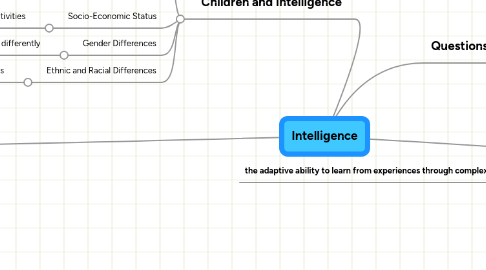
1. the adaptive ability to learn from experiences through complex mental processes to modify future behavior to accomplish a new task.
2. Components of Intelligence
2.1. Theoretical Perspectives
2.1.1. Spearman's General Factor g
2.1.1.1. The general ability to think about a wide variety of tasks
2.1.2. Cattell's Crystal and Fluid Intelligence
2.1.2.1. Two distinct components of general intelligence
2.1.2.1.1. Fluid Intelligence
2.1.2.1.2. Crystallized Intelligence
2.1.3. Gardner's Multiple Intelligences
2.1.3.1. People have multiple intelligences that are independent of one another
2.1.4. Sternberg's Triarchic Theory
2.1.4.1. Intelligence involves an environmental context, prior experiences, and cognitive processes
2.1.5. Distributed Intelligence
2.1.5.1. People perform more intelligently when working with others
2.2. Measures of Intelligence
2.2.1. General Intelligence Tests
2.2.1.1. Wechler Intelligence Scale
2.2.1.1.1. Consists of 13 tests with verbal tests and object manipulation
2.2.1.1.2. Examples of tests include symbolic and spatial memory tests
2.2.1.1.3. Test scores are based upon a verbal score and a nonverbal score (performance score)
2.2.1.2. Stanford-Binet Intelligence Scale
2.2.1.2.1. Uses responses from from verbal material such as defining vocabulary, and others involving concrete objects (remembering a sequence of pictures)
2.2.1.2.2. Provides an overall IQ score as well as more specific scores such as knowledge and quantitative reasoning
2.2.1.3. Universal Non-Verbal Intelligence Test
2.2.1.3.1. Unlike the other tests, this involves no language whatsoever.
2.2.1.3.2. Consists of six subtests involving memory or reasoning using visual stimuli
2.2.1.3.3. Commonly used for children with hearing impairments or disabilities, but can be applied universally
2.2.2. Specific Ability Tests
2.2.2.1. Developed to assess specific cognitive abilities
2.3. Group Differences
2.4. Hereditary and Environmental Influences
3. Children and Intelligence
3.1. Nature vs. Nurture
3.1.1. The environment in which a child is raised plays a part in the shaping of their intelligence.
3.1.1.1. Different environments provide different opportunities to gather and process information
3.1.2. The way a child is raised (child rearing) plays a role in how intelligence is shaped
3.1.2.1. Productive and reinforcing behaviors by parents provide a comforting and encouraging environment
3.1.2.2. Opportunities to participate in school and extracurricular activities increase the child's cognitive processes
3.2. Socio-Economic Status
3.2.1. Plays into the child's ability to have access to certain opportunities and activities
3.3. Gender Differences
3.3.1. Males and Females learn differently
3.4. Ethnic and Racial Differences
3.4.1. Cognitive differences vary amongst races
